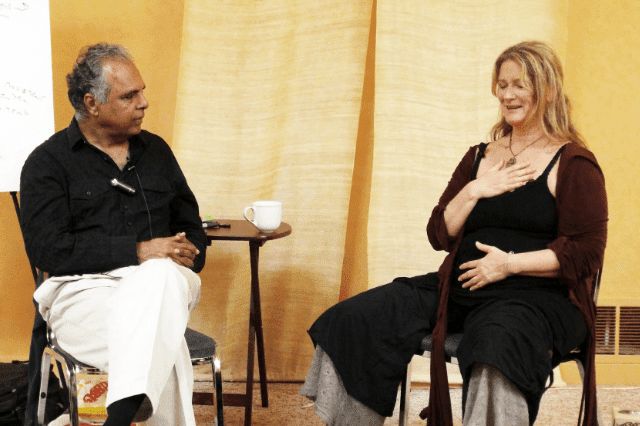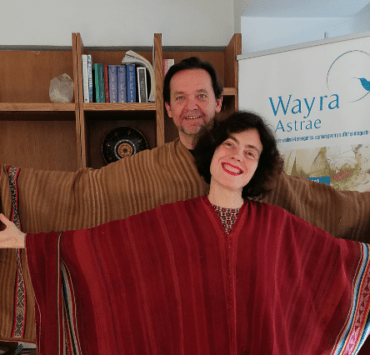Trebuie să facem mai mult loc emoției

Epoca noastră pare să se teamă de emoții: le „rezolvă” și dizolvă rapid, prin medicamente, cogniție sau comportament, pentru a nu le da prilejul de a crea traume. Dar nici dezvoltare psihică. Am stat de vorbă cu dr. Raja Selvam despre metoda sa de întrupare a emoțiilor, care vizează o toleranță mai bună pentru contrarii, premisă a progresului spiritual.
Varianta în română
Psychologies: Ce a însemnat pentru dr. Raja Selvam să se nască în India?
Dr. Raja Selvam: India în care am crescut a fost o societate multiculturală, multilingvă, multietnică, multirasială, multireligioasă, tolerantă și pașnică, în ciuda defectelor sale profunde, dintre care unul este sistemul de caste. Privind în urmă, cred că un astfel de început m-a ajutat foarte mult să mă pregătesc pentru viața mea actuală, care este ancorată în trei țări, SUA, Germania și India, și pentru a preda în aproape douăzeci și cinci de țări de pe șase continente.
Există, în adâncul psihicului colectiv indian, o înțelegere și acceptare că toate viețile individuale se desfășoară ca parte integrantă a unui psihic colectiv care guvernează toate destinele individuale. Dacă asta seamănă foarte mult cu psihologia lui Carl Jung, nu este o surpriză. Jung a fost profund influențat de Orient atunci când și-a conturat viziunea despre psihic. Atunci când m-am îndreptat către studiul psihologiei în SUA, era firesc să fiu atras de modelul jungian cuprinzător al psihicului. Acceptarea indiană a vieții așa cum se desfășoară ea m-a ajutat și într-un alt fel. Viața mea a luat multe întorsături. Am trecut de la economie, statistică și afaceri în industrie și mediul academic la psihologie, studiul, practica și predarea psihologiei clasice, somatice și energetice. Faptul că am putut să renunț la ceva și să abordez altceva atunci când mi s-a părut oportun, faptul că am putut să integrez multe lucruri în viziunea mea asupra lumii, cred că are de-a face și cu felul în care am crescut în India, acolo unde psihicul este înțeles în profunzime și oamenii știu că toate viețile indivizilor se desfășoară așa cum le este destinul.
Care dintre experiențele dvs. din copilărie și adolescență v-au determinat să vă îndreptați atenția către domeniul psihologic?
Dr. R. S.: Trauma nașterii mele, în care mama și cu mine aproape am murit, apoi despărțiri repetate de mama mea începând de la vârsta de zece luni până la vârsta de patru sau cinci ani, abuz fizic, verbal și emoțional din partea tatălui și așa mai departe. Efectul negativ al acestor traume asupra vieții profesionale și relațiilor în viața mea adultă m-a condus către domeniul psihologiei, în diferitele sale forme, psihanalitică, jungiană, cognitivă, comportamentală, somatică, spre psihologia dezvoltării, a traumei, dar și spre psihologia energetică și spirituală.
Citește continuarea articolului în ediția de februarie 2023 a revistei Psychologies sau abonează-te și primește revista lunar, prin curier.
English version
Psychologies: Dr. Selvam, let me first ask you what it meant to you to be born in India?
Dr. Raja Selvam: The India I grew up in was a multicultural, multilingual, multiethnic, multiracial, multireligious, tolerant, and peaceful society despite its deep flaws one of which is the caste system. Looking back, I think that such a beginning helped me a lot to prepare for my current life which is anchored in three countries, the US, Germany, and India, and for teaching in nearly twenty-five countries on six continents.
How did you feel the spiritual and emotional impact of this ancient culture while you were in India – and then when you arrived in the US?
Dr. R. S.: There is, deep in the Indian collective psyche, an understanding and acceptance that all individual lives unfold as part and parcel of a collective psyche that governs all individual destinies. If this sounds a lot like the psychology of Carl Jung, it is no surprise. Jung was deeply influenced by the East in his formulation of the psyche. When I turned to the study of psychology in the US, it was natural that I would gravitate toward the comprehensive Jungian model of the psyche inspired by the East. The Indian acceptance of life as it unfolds also helped me in another way. My life has taken many twists and turns. I went from economics, statistics, and business in industry and academia to psychology, the study, practice, and teaching of mainstream, somatic, as well as energy psychologies. That I could let go of one thing and go into the next thing when it felt right and integrate many things into my worldview I think also has to do with growing up in India with its comprehensive understanding of the psyche and its understanding that all individual lives unfold as destined.
Which of your childhood and teenage experiences prompted you to turn your attention to the psychological field?
Dr. R. S.: The trauma of my birth in which my mother and I nearly died, repeated separations from my mother starting at the age of ten months till I was four or five years old, physical, verbal, and emotional abuse from father, and so on. The adverse effect of these traumas in work and relationship in my adult life led to me to the field of psychology in its various forms, psychoanalytic, Jungian, cognitive, behavioral, somatic, developmental, traumatic, energetic, and spiritual.
What do you think is the biggest difference between Eastern and Western psychology? How much does the fact that the West makes a strict separation between „soul” and „body” weigh in this context?
Dr. R. S.: The biggest difference is the assumption in Western psychology, based on the philosophy of Emmanuel Kant, that there is an absolute difference between the subject and the object. There can be no subject without an object in that view. In Eastern philosophy, a subject can exist without an object, a subject that is aware of itself without making itself or part of it into an object. This is the reason, as I wrote in my dissertation for a Ph.D. in clinical psychology, why Carl Jung could not imagine that the basis of all creation is an unlimited and unchanging body of pure awareness, something that modern quantum physics finds possible more than modern psychology in the West.
On a lower level of the psyche, the distinctions between mind and body, physical body and energy or subtle body, soul and body, and what is called the body-mind problem, are a product of dualism that goes back to the philosophy of Kant and from a strong tendency to classify and separate things. While useful for scientific and analytical purposes, the belief that such classification and separation is the natural order of things, the ultimate truth, obscures reality and limits our understanding of ourselves and the world. In the past twenty five years, we have so much evidence in neuroscience and cognitive psychology that cognition, emotion, and behavior are inseparable not only in experience but also in their underlying physiological mechanisms; and that there is no ‘free will’ at the level of the individual.
In Eastern psychology as well as in my approach of Integral Somatic Psychology (ISP), the subtle body is also physical in nature but made up of only quantum phenomena (subatomic particles) that are difficult to observe and measure. The mind and the body are one and the same. The same thing applies to the body and the soul. They are both bodies. The soul exists only at the subtle or quantum level whereas the body exists at both quantum and gross or non-quantum level of reality.
The simplest argument to establish that mind and body as well as soul and body are of the same material is that if they were totally different one cannot affect the other. But they do!
How did you create Integral Somatic Psychology? Who supported you and who opposed? What does it mean to embody emotions?
Dr. R. S.: Things just happen through us, through trial and error. Therefore, I cannot claim to have created anything including Integral Somatic Psychology (ISP). I believe that things that develop through a person are to mature the individual towards a greater understanding of themselves. They are also for the benefit of others, hopefully, if it is meant to be.
In developing Integral Somatic Psychology (ISP), I wanted to develop a complementary science-backed somatic approach that could improve different outcomes and shorten treatment times in all therapy modalities including body and energy therapies. Even though it is backed up by scientific findings, as it involves body and energy concepts, it made sense that it would not be easily accepted by those whose training has little or no body or energy orientation which accounts for most training in the field of psychology, unfortunately. There is another reason why people might find ISP difficult when it is becoming more or less the norm to help people get rid of their suffering as quickly as possible. ISP is based on the idea that the capacity to tolerate opposites in human experience, the pain as well as the pleasure, is key to psychological and spiritual growth.
Embodying emotion involves expanding the conscious experience of an emotion to as much of the brain and body physiology as possible so as to create a greater capacity for the emotion. When we do that by working with psychological, physiological, and innate defenses against emotions while we support the person to have the emotion with as much empathy and sympathy as needed, the body becomes more open or regulated physically and energetically, capacity to stay with and process the emotion improves. Emotion gets more regulated and resolves. In addition, cognition, behavior, relationship, and one’s connection to the collective improves because the science of embodied and embedded cognition tells us that cognition depends not only on the brain but also on the body and the environment the body is situated in and connected to.
Is our age more lacking in emotion or more lacking in control?
Dr. R. S.:We always have emotion in every age because emotion is how we come to know how things affect us. What has differed is the way we understand emotion and deal with it. In psychology, we first believed that it was cognition that regulated or dysregulated emotion and behavior. We then believed that it was behavior that determined emotion and behavior. Both are partially true. Hence their appeal. Now, there is simply too much evidence that it is emotion that determines cognition and behavior in every moment even though cognition and behavior can subsequently alter emotion. We are also learning that emotion involves the entirety of the brain and body physiology and it is often the difficulty in tolerating emotion that shuts the body down compromising not only emotion but also cognition and behavior that also depend on the body. We can say that we are lacking emotion these days in that we try to get rid of it through medication or cognition or behavior. We can also say that we are using ways to control emotions that are not optimal. The best way to do that, to regulate emotion, is to develop a greater capacity for it. The practice of embodying emotion is a simple method for regulating emotions through the body that both therapists and laypersons can incorporate into their way of regulating emotions.
Are you of the opinion that healing – at least on the emotional level – can’t happen if the so-called „body” doesn’t participate? How do we practically embody the emotions? What role does the kinesthetic component play here?
Dr. R. S.: To use tools such as awareness, intention, self-touch, therapist’s touch, breath, or movement to expand the experience of emotion to as much of the brain and body physiology as necessary for the situations people find themselves in. My book, The practice of embodying emotions: A guide for improving cognitive, emotional, and behavioral outcomes, which will be out in Romanian in late 2023 or early 2024, is a detailed account of the theory and the practice of embodying emotions, the core clinical strategy in Integral Somatic Psychology (ISP). It is being published by V & I Herald.
What you called „spiritual bypass” poses the problem of „rationalising” the problems that involve us emotionally. We find a reason for what is happening and that has to do with a supposed spiritual development that we have heard and/or read about. It is a very powerful internal trap. How can we tell if what we consider to be another step on the road to our spiritual ascent is somehow nothing more than a rationalization, some food for a deficient Self and an argument to remain in the state of comfort and in fact to avoid spiritual development?
Dr. R. S.: When we do a „spiritual bypass”, we usually engage in it in order to avoid the necessary suffering that both wise psychological and spiritual approaches tell us we need to face and process to resolve difficulties in life as well as to develop our souls. We can easily see spiritual bypass being used as a defense when a person is failing miserably in handling their personal or professional relationships.
How do you see spiritual evolution? Is it accessible to contemporary man living in our western world?
Dr. R. S.: Souls are always evolving, through trial and error, through multiple lives, to a greater and greater understanding of who they are. The end point is enlightenment, that one is the unlimited and unchanging basis of everything there is. It is available to every soul in every age, if it is the destiny of that soul to get enlightened in this life or that. This is preceded by the greater opening of the heart to everything and everybody which in turn depends on the capacity to tolerate opposites in emotional experiences in the most limited body we acquire in each life to live out our purposes in that life and to grow our souls.
Can we tolerate dissonances, can we feel two opposite emotions at the same time, can we tolerate this intolerable, if we embody these emotions without that intellectual bridge of „rationalization” that falsifies thought processes – and in the long run affects our ability to think critically? Give us an example of how we can do this.
Dr. R. S.: We can develop the capacity to tolerate the intolerable, to the extent necessary that the emotions involved are not placing a constraint on our growth. We might have to use cognition and behavior as tools in order to process our emotions or avoid them. But it has to be ultimately done as an experience in the body, the container we acquire in each life not only to process things that happen to us in that life but also to complete the processing of things that have happened to us in prior lives that are constraining the further development of the soul.
As an example, a woman whose heart was closed after a divorce, who could not open her heart to her current partner, was able to expand and embody the heart-shattering emotional experiences of betrayal by her ex-husband to open her heart to her current partner from a single session. Others have reported deepening of their spiritual experiences when they incorporated the practice of embodying emotions.
How does an event become a trauma?
Dr. R. S.: The more an event dysregulates and stresses the physiology of the brain and the body, the more likely it qualifies as a traumatic event.
It is possible for one and the same event to trigger a trauma and a whole category of psychological and somatic disorders for A, and for B to trigger perhaps pain, but in the long term leave no traces. We can say that between A and B there are some differences, from several points of view:
- psychological
- spiritual
- neurological
Dr. R. S.: Yes. The reason can be neurological, psychological, spiritual or something else. Rsearch has shown that only 5% of men and 10% of women develop Post-Traumatic Stress Disorder (PTSD) in normal times. Individual resilience is hard to predict. There are simply too many variables in the psyche that is complex and is ultimately collective in its depth.
Under what conditions can a trauma become a factor of spiritual growth?
Dr. R. S.:When the necessary suffering caused by trauma is faced and worked through, with the necessary support from others.
Roxana Melnicu este redactor-șef al revistei Psychologies. Psiholog din 1997, jurnalist din 2000, Roxana a tradus numeroase lucrări din câmpul psihologic, iar obiectivul ei este ambițios: construirea unei culturi psihologice care să fie activă pe o pe scară cât mai largă în societatea românească.








